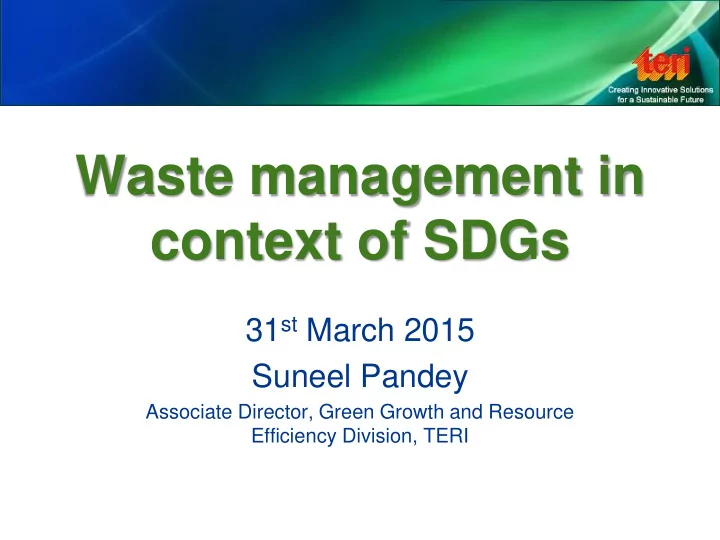

Waste management in context of SDGs 31 st March 2015 Suneel Pandey Associate Director, Green Growth and Resource Efficiency Division, TERI
Increasing complexity of waste streams Upto 1980s Upto 1990s Present • Municipal solid • Construction • E-waste • Packaging waste and demolition • Industrial debris waste • Plastic waste • Exhaustive PV hazardous and • Hospital waste nonhazardous waste wastes • Municipal sewage • Industrial wastewater • Air pollution • Emission from from stacks incinerators
Varied impacts of disposal
Municipal solid waste – Indian scenario • Present generation - 62 MT • In efficient collection – efficiencies range from 50 to 90% in major metros; smaller cities, it is around 50% • Inadequate transportation facilities in more than 70% of the cities • Inadequate disposal – very few sanitary landfills • Biomedical waste, slaughter house waste, industrial waste often reaching the MSW dumpsites posing potential hazard to sanitary workers and rag pickers
Land requirement • As per the CPCB report 2012-13 – If all the waste is disposed, it will need 3,40,000 m 3 of landfill space every day – In the present situation the municipal areas generate 1,33,760 TPD waste, of which only 25,884 TPD is treated and 1,07,876 TPD is disposed on land requiring around 2,12,752 m 3 of land fill space – Requirement of land for next 20 years could be as high as 66,000 ha (1240 ha per year)
Background - SDGs • Environmentally sound management of Chemicals and Waste • 10 focus areas cover the issues with suggested 24 targets & indicators to measure the progress
Focus areas • (1) Poverty - 1 • (8) Economic growth, employment & • (2) Sustainable infrastructure - 2 agriculture, food security • (9) Industrialization & & nutrition - 2 promoting equality among • (3)Health & Population the nations - 4 dynamics - 2 • (10) Sustainable cities & • (4) Education & life long human settlement - 1 learning - 2 • (11) Sustainable • (6) Water & sanitation - 3 consumption & production - 6 • (15) Means of implementation - 1
Scope in relation to waste sector for the year 2030 (1) • Management with life cycle focus to minimize impact on human health and environment and reduce poverty • Reduce burden of disease from exposure including poor, women, children and indigenous population • Awareness raising on benefits and risk of managing waste • Promote research in cleaner technologies & processes • Reduce release to receiving environment due to anthropogenic activities • Reduce contamination of surface and ground water • Improved ecosystem management by addressing contamination of receiving environment
Scope in relation to waste sector for the year 2030 (2) • Increase number of safe and decent jobs • Ensure sustainable formalization/organisation process of the micro and small scale waste management sector • Ensure sustainable management of waste in urban areas • Safe working conditions to all workers • Improved compliance with legal obligations under international, regional and national law in sustainable management of waste and other relevant international regimes (IMO; ILO; WHO)
Life cycle perspective
Stakeholder engagement
Partnerships Source: P Modak
Benefits of investing in waste sector • Resource & energy conservation • Job creation • Resource production – compost & energy • Reduced GHG emission • Equity and poverty reduction
Estimated waste market
Thank you
Recommend
More recommend